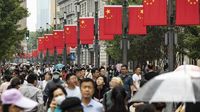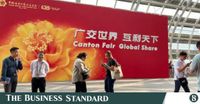Chinese exporters are actively seeking new global markets as the ongoing trade war with the United States continues to impact their businesses. This quest for diversification has led many companies to participate in trade fairs, which serve as vital platforms for showcasing products and establishing sales channels to mitigate the effects of high tariffs. Among the most significant events are the Canton Fair and the China International Consumer Products Expo (CICPE), both of which are crucial for businesses looking to expand beyond traditional markets like the U.S.
This year's Canton Fair, being held in Guangzhou, Guangdong Province, has attracted around 31,000 firms, a notable increase of nearly 900 participants compared to the previous event. The fair runs until May 5, 2025, and exhibitors are eager to forge new business relationships in alternative markets.
"We will surely expand our markets abroad besides the United States. This product is a key focus at present. It has up-to-date functions. Clients from Poland and the Netherlands wanted to sign an exclusive distribution agreement with us right here," said Tang Shousheng, an exhibitor at the fair. His statement reflects a growing trend among Chinese businesses to seek out new partnerships and opportunities in regions less affected by U.S. tariffs.
Beyond merely seeking new markets, Chinese exporters are also investing in overseas production facilities to bolster their global presence. Huang Shuyu, another exhibitor, revealed plans to invest 10 million yuan (approximately 1.37 million U.S. dollars) in establishing overseas factories. "In fact, we have already found local suppliers for essential components such as plastics, SMT (surface-mount technology) patches, and packaging materials like color boxes," Huang noted, underscoring a strategic shift towards localizing production to reduce dependency on imports.
The CICPE, which recently concluded, saw many Chinese exporters striving to diversify their brands and supply chains. This effort aims to ensure resilience amid an unpredictable trade environment. Ran Yan, an exhibitor at the CICPE, shared insights about their brand strategy: "We started to launch our own brands last year, and these products have performed very well in the Russian market." This highlights a proactive approach to brand management and market adaptation.
Despite the challenges posed by the trade war, many exhibitors remain committed to global expansion. "We have not given up the global industrial layout in terms of our overall brand strategy," stated Li Rongsheng, another participant at the fair. This sentiment reflects a broader resolve among Chinese exporters to navigate the complexities of international trade, even in the face of significant obstacles.
The ongoing trade tensions have seen the U.S. impose tariffs exceeding 145 percent on Chinese goods entering the country. These tariffs have had a considerable impact on trade dynamics, prompting a rush among companies to export before further increases take effect. As a result, China's exports surged by 12.4% in March 2025 compared to the previous year, showcasing a last-minute flurry of activity as businesses aimed to mitigate the effects of impending tariffs.
In response to the challenges of the trade war, Chinese tech groups have initiated a multibillion-dollar campaign to assist exporters in enhancing their domestic sales capabilities. This initiative aims to bolster the resilience of Chinese businesses by providing them with the necessary resources and support to thrive in both local and international markets.
The trade war has undoubtedly reshaped the landscape for Chinese exporters, forcing them to adapt and innovate in order to survive. As they explore new markets and invest in production capabilities abroad, the future of Chinese trade remains uncertain yet filled with potential. The actions taken by these businesses at trade fairs like the Canton Fair and CICPE will be crucial in determining their success in navigating the complexities of global trade.
Overall, the commitment of Chinese exporters to diversify their markets and invest in new production strategies reflects a significant shift in their approach to international trade. As they seek to offset the impacts of tariffs and trade tensions, these companies are redefining their strategies to ensure long-term sustainability and growth.






